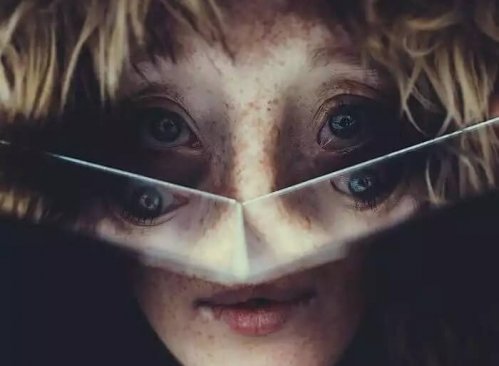Facial Malformations and Their Unexpected Effects

Your facial structure has a huge effect on the development of your identity as a whole, especially your social identity.
You recognize other people by their face, not by their hands, legs, or body. In some European societies, people see facial malformations, scars, or very pronounced wrinkles as defects.
Depending on the context, the effects of facial malformations can range from moderate to severe. In some cases, their influence on a person’s emotional state can be very powerful. This is especially true when these scars occur in early childhood. Alternatively, this may happen in environments where people value physical appearance.
“Out of suffering have emerged the strongest souls; the most massive characters are seared with scars.”
-Khalil Gibran-
Facial malformations and interactions
People with physical differences tend to have particular interactions with the world. A study stated that many people react to people with facial malformations or marks by keeping their distance or looking away. Although these may seem like small gestures, they can have a big psychological impact. They’re subtle means of rejection that people with physical differences have to deal with on a daily basis.
On the other hand, those facial differences receive unwanted attention in public spaces. Someone with a “normal” face doesn’t have to deal with that attention from strangers. However, in the case of people with facial malformations, many strangers pay undue attention to those features. Sometimes they may even make unwanted comments about them. Basically, it’s as if they have no right to go about in public anonymously. They’re always objects of public attention.

Facial scars and destiny
People tend to look at another person’s face when they’re talking about them. Whether consciously or unconsciously, faces remind you of certain symbols. For example, there was a story on the news about an Ecuadorian family who rejected their daughter because she was born with a great purple mark on her face. They took it as a sign of misfortune due to certain superstitions they believed in, which is why they decided to abandon her.
People may associate facial malformations with “ugly”, “bad”, or “sinister” symbolism. In fact, a study that researchers carried out in Europe in 2008 claims that up to 56% of people with these types of facial features exhibit signs of depression.
Surprisingly, another study that researchers in the United Kingdom carried out showed that teenagers with a cleft palate or congenital craniofacial defects showed a higher level of self-acceptance than people with normal faces. However, this study didn’t discuss the possible reasons why this happened.

The road to self-acceptance
A person with facial malformations, acne scars, or other visible facial lesions may have a hard time. These conditions can easily lead to isolation. Alternatively, they may lead to feelings of shame
The same group of researchers we mentioned above that carried out a study in 2008 discovered that half of their sample population with facial malformations had self-esteem problems. Also, 21% suffered from anxiety and 26% felt generally angry and frustrated with life.
As with many other difficult life situations, it’s possible for people to deal with and overcome the possible psychological effects of facial malformations. The key is to focus on self-acceptance. Although it isn’t a process devoid of highs and lows, it is achievable.

A person with visible malformations should seek psychological help if they need it, as studies tell us that those who face big challenges and get over them tend to become wiser and also develop better mental resources that may help them live exemplary lives.
Your facial structure has a huge effect on the development of your identity as a whole, especially your social identity.
You recognize other people by their face, not by their hands, legs, or body. In some European societies, people see facial malformations, scars, or very pronounced wrinkles as defects.
Depending on the context, the effects of facial malformations can range from moderate to severe. In some cases, their influence on a person’s emotional state can be very powerful. This is especially true when these scars occur in early childhood. Alternatively, this may happen in environments where people value physical appearance.
“Out of suffering have emerged the strongest souls; the most massive characters are seared with scars.”
-Khalil Gibran-
Facial malformations and interactions
People with physical differences tend to have particular interactions with the world. A study stated that many people react to people with facial malformations or marks by keeping their distance or looking away. Although these may seem like small gestures, they can have a big psychological impact. They’re subtle means of rejection that people with physical differences have to deal with on a daily basis.
On the other hand, those facial differences receive unwanted attention in public spaces. Someone with a “normal” face doesn’t have to deal with that attention from strangers. However, in the case of people with facial malformations, many strangers pay undue attention to those features. Sometimes they may even make unwanted comments about them. Basically, it’s as if they have no right to go about in public anonymously. They’re always objects of public attention.

Facial scars and destiny
People tend to look at another person’s face when they’re talking about them. Whether consciously or unconsciously, faces remind you of certain symbols. For example, there was a story on the news about an Ecuadorian family who rejected their daughter because she was born with a great purple mark on her face. They took it as a sign of misfortune due to certain superstitions they believed in, which is why they decided to abandon her.
People may associate facial malformations with “ugly”, “bad”, or “sinister” symbolism. In fact, a study that researchers carried out in Europe in 2008 claims that up to 56% of people with these types of facial features exhibit signs of depression.
Surprisingly, another study that researchers in the United Kingdom carried out showed that teenagers with a cleft palate or congenital craniofacial defects showed a higher level of self-acceptance than people with normal faces. However, this study didn’t discuss the possible reasons why this happened.

The road to self-acceptance
A person with facial malformations, acne scars, or other visible facial lesions may have a hard time. These conditions can easily lead to isolation. Alternatively, they may lead to feelings of shame
The same group of researchers we mentioned above that carried out a study in 2008 discovered that half of their sample population with facial malformations had self-esteem problems. Also, 21% suffered from anxiety and 26% felt generally angry and frustrated with life.
As with many other difficult life situations, it’s possible for people to deal with and overcome the possible psychological effects of facial malformations. The key is to focus on self-acceptance. Although it isn’t a process devoid of highs and lows, it is achievable.

A person with visible malformations should seek psychological help if they need it, as studies tell us that those who face big challenges and get over them tend to become wiser and also develop better mental resources that may help them live exemplary lives.
This text is provided for informational purposes only and does not replace consultation with a professional. If in doubt, consult your specialist.







